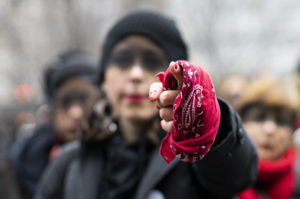An explicit tweet about social etiquette at a condomless gay orgy recently went viral as the mostly heterosexual public grappled with the sheer perversity of what they were reading:
Is it unethical to attend a “no loads refused” pimped-out cumdump event if the bottom has blocked you on Twitter even though you’ve never talked to them and have no idea why?
Twitter freaked out: “What exactly is a ‘pimped-out cumdump event’?” “How strict is this ‘no loads refused’ policy?” “Is an anonymous block really an undumpable load offence?”
While this dude’s attempt to grapple with the social niceties of the orgy might seem a particularly extreme example, the online furore it attracted does seem to reflect a cultural misunderstanding of gay male sexuality. It is deemed problematic — an attitude that is often accompanied by a desire to do something about it.
Soon after the MeToo movement kicked off in 2017, there were calls to look beyond the violence of men against women, to include the (perceived) toxic sexual norms among gay men. Camila Martinez-Granata wrote in VICE about “pervasive” sexual harassment in gay bars, where getting groped and squeezed without warning is practically a rite of passage. She called for the fostering of “truly safe spaces in queer nightlife” — ones that rejected the “normalisation of sexual harassment”. A year later, Michael Segalov wrote in the Guardian that “the conversation around consent for gay men has been stifled”.
Some of the statistics cited in these articles depict an epidemic of sexual assault within gay spaces. Half of gay men in both the UK and the US say they have experienced sexual touching without their consent. Researchers have also noted the normalisation of “sexual coercion” among gay men — defined broadly as “a range of ways in which men may be forced or pressured to have unwanted sex”. Examples include pressure to accept undesired “top” or “bottom” positions, for the satisfaction of one’s sexual partner.
MeToo has seen some prominent gay men called out for their predatory behaviour: Kevin Spacey was rightly shunned from Hollywood for assaulting the underage Anthony Rapp, while Terry Crews and other straight male actors have called out the culture of unwanted groping by prominent gay producers. However, there has been a notable lack of reckonings for gay male culture more broadly, despite claims that “toxic” norms are rife in our sexual lives.
Sexual assault researchers appear particularly incredulous that gay men aren’t fighting back. After finding that 70% of a sample of gay men had experienced “unwanted sexual touching”, researchers at the University of Georgia decried the norms of “sexually aggressive” behaviour among gay men, before lamenting that they “do not perceive what happened to them as sexual violence”. In a similar vein, researchers within The Journal of Sex Research complained, with the necessary proviso that “the authors are sex positive”, that problematic sexual scripts were exhibited by gay men — from “hypersexual male identity” to a “lack of emotional responsibility”, particularly for casual partners.
However, such criticisms are incredibly patronising, reflecting a wilful ignorance of gay desire. Commentators apparently struggle to grasp that norms designed to stop the predatory behaviour of men towards women may be ill-suited to the dynamics of sex between men.
Gay men are known for being “sexually adventurous” — a polite way of saying that we’ve got so many notches in our belt, our trousers can barely stay up. While most gay men ultimately wish for (and find) emotionally committed “monagamish” relationships, based around romantic love, it’s also very common to have a period of sowing one’s wild oats, actively seeking out novel sexual encounters with strangers. Gay fantasies often revolve around dangerous liaisons, with non-verbal anonymous sexual encounters as well the eroticising of thuggish “rough trade” personas.
This has been true since the origins of gay male identity. The novels of early 20th-century gay French author Jean Genet — described by Richard Howard as “the first and perhaps the only texts to set forth for the Western imagination an explicit realisation of homosexual eros” — are rife with sadomasochistic gay fantasy. Take this expression of desire from Genet’s novel, Quarelle of Brest:
He could get away with anything. Spit me in the face, call me by my first name.
“You’re getting overly familiar!” I’d say to “Him”.
The blow he would strike me with his fist, right in the mouth,
Would make my ears ring with this oboe murmur: “My vulgarity
is regal, and it accords me every right.”
Gay bars and clubs are known for their “seedy” undercurrent because their primary function — much more so than heterosexual spaces — is to enable sexual conquest. This is why the presence of women in gay bars is seen as so ruinous and why the rise of hook-up apps like Grindr threaten the long term viability of these (supposed) “safe spaces”. The perennial art of “cruising” — seeking out strange men in sex clubs, saunas and public toilets — once rationalised as a form of “self-hatred”, is now clearly understood as simply what many gay men like to do.
The average sauna hook-up occurs via a barely lit labyrinth with interlocking rooms playing pornography. Partners are selected through elaborate non-verbal interactions, looks are exchanged, buttocks and crotches are groped and you’re either led into a room or given a swift rejection. Young gay men quickly learn to master the intricate art of seeking and self-defence: keeping your towel up with one hand, while playing an elaborate game of whack a mole with the prying hands of ugly men with the other.
The high prevalence of non-consensual groping in these environments is part of the ritual gay men have signed up to in order to embrace their sadomasochistic fantasies. It’s also why applying norms of “affirmative consent” — designed to reflect the needs of vulnerable women — can be problematic when applied to gay men.
Feminist Sheila Jefferys, in her influential work Anticlimax: A Feminist Perspective on the Sexual Revolution, could barely conceal her disgust at gay desires, which “eroticised power difference” and were reflective of the “worship of masculinity”. However, this is a classic case of applying feminist norms, designed by and for women, to a group which may not share the same wants and needs.
Recently, an Australian politician was asked to explain how newly-imposed affirmative consent laws would work within the context of a gay sauna. In relation to the physical tête-à-tête which occurs while cruising, she noted: “if the person is consenting, they might lean their body into the other person or engage in reciprocal touching.” As for sex, her response was that consent must be given within a “reasonable time” and “might include verbal or non-verbal interactions about consent and the parameters of the sexual act to occur before entering the dark room, provided they continue negotiating consent through ongoing and mutual negotiation”.
This response reflects the awkwardness of applying the norms of consent demanded by MeToo to sexual encounters between men. Focus groups with gay men on the of topic affirmative consent have consistently shown a disconnect between the safeguarding goals of advocates and the kind of sexual encounters they want to have. One researcher noted that most gay men believe affirmative consent “was not created with them or the diversity of gay sexual culture and subcultures in mind”.
The divide between female and male desire has become even more pronounced as various MeToo offshoots have proliferated. There has been much discussion about age gaps, for instance: differences in age are seen to reflect a “power imbalance” that is inherently coercive. This is a laughable idea from the perspective of many gay couplings, where large age gaps are incredibly common, seemingly driven by mutual desires for maturity and youth.
Last year, Labour MP Luke Pollard was bombarded with abuse after a Valentine’s Day post on social media revealed his significantly younger boyfriend. Reflecting on the backlash, writer Christopher Sherwood noted that he received similar accusations of being “taken advantage of” when he entering into a relationship with a 61-year-old man at the age of 24. “My attraction to older people has nothing to do with emotional and material needs,” he notes, going on to clarify he was motivated by a “seemingly innate sexual attraction to the mature physical form”.
It very well may be that many young women often find relationships with older men harmful (although clearly for some women they aren’t) — but this logic shouldn’t be wholesale applied to gay relationships with their own longings and dynamics. It’s unwise to encourage commentators and researchers to apply their own criteria of “healthy sex” to gay men — or indeed any group — who do not see their experiences as problematic. What counts as a predatory violation for some may not be for others.
Still, one can criticise the application of MeToo’s new frameworks to gay spaces without supporting sexual anarchy. There is no doubt that many gay men have experienced sexual violence, and moral norms should be developed to encourage restraint. While pervy saunas and “no loads refused” parties may give off the aesthetic of Dionysian excess, respect for bodily autonomy and awareness of potential harm should always be paramount.
But defining the boundaries of assault should be left to gay men — we should be able to generate a response free from the feminist assumptions generated by the fraught conflicts of heterosexuality. Do gay men need a MeToo moment? No, but we should be having our own conversations about setting the appropriate limits on desire, to ensure sadomasochistic gay fantasy doesn’t turn into outright brutalisation.
Disclaimer
Some of the posts we share are controversial and we do not necessarily agree with them in the whole extend. Sometimes we agree with the content or part of it but we do not agree with the narration or language. Nevertheless we find them somehow interesting, valuable and/or informative or we share them, because we strongly believe in freedom of speech, free press and journalism. We strongly encourage you to have a critical approach to all the content, do your own research and analysis to build your own opinion.
We would be glad to have your feedback.
Source: UnHerd Read the original article here: https://unherd.com/





